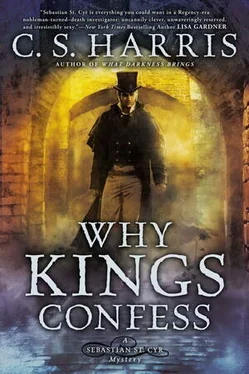C. Harris - Why Kings Confess
Здесь есть возможность читать онлайн «C. Harris - Why Kings Confess» весь текст электронной книги совершенно бесплатно (целиком полную версию без сокращений). В некоторых случаях можно слушать аудио, скачать через торрент в формате fb2 и присутствует краткое содержание. Год выпуска: 2014, Издательство: Penguin Group US, Жанр: Исторический детектив, на английском языке. Описание произведения, (предисловие) а так же отзывы посетителей доступны на портале библиотеки ЛибКат.
- Название:Why Kings Confess
- Автор:
- Издательство:Penguin Group US
- Жанр:
- Год:2014
- ISBN:нет данных
- Рейтинг книги:5 / 5. Голосов: 1
-
Избранное:Добавить в избранное
- Отзывы:
-
Ваша оценка:
- 100
- 1
- 2
- 3
- 4
- 5
Why Kings Confess: краткое содержание, описание и аннотация
Предлагаем к чтению аннотацию, описание, краткое содержание или предисловие (зависит от того, что написал сам автор книги «Why Kings Confess»). Если вы не нашли необходимую информацию о книге — напишите в комментариях, мы постараемся отыскать её.
Why Kings Confess — читать онлайн бесплатно полную книгу (весь текст) целиком
Ниже представлен текст книги, разбитый по страницам. Система сохранения места последней прочитанной страницы, позволяет с удобством читать онлайн бесплатно книгу «Why Kings Confess», без необходимости каждый раз заново искать на чём Вы остановились. Поставьте закладку, и сможете в любой момент перейти на страницу, на которой закончили чтение.
Интервал:
Закладка:
She shook her head. “No. I fear there are times when Marie-Therese’s grief simply becomes too much for her. When she reaches that point, she is impossible to calm and can make herself ill. In such situations, sleep becomes the only reasonable recourse.”
In other words, Lady Giselle had dosed the hysterical Princess with laudanum.
Now she sat with her fingers laced together in her lap, her features composed in an expression of calm beatitude that would have done justice to St. Louis himself. She said, “Marie-Therese had asked me to return and see Pelletan-to ask the questions she herself had been unable to broach. And so I did.”
“What did you discover?”
“Very little, actually. He became quite angry when he realized why I was there and refused to discuss the subject any further. So we left.”
“We?”
A faint note of exasperation crept into her voice. “You don’t seriously think I would undertake such a visit alone, do you? My mother’s cousin, the Chevalier d’Armitz, was kind enough to accompany me.” Again, that charming tilt of the head as her pretty forehead crinkled with a show of confusion. “Why are you asking me these questions?”
“Because you and your cousin were amongst the last people to see Damion Pelletan alive. What was he doing when you left the inn?”
She shrugged. “The last I saw, he was standing on the footpath outside the inn, staring up at the night sky. As I said, the conversation visibly disturbed him. He may have been trying to compose himself before returning inside.”
“Did you see anyone else while you were there?”
“We spoke to a servant in the coffee room, if that’s what you mean. But I don’t recall noticing anyone else.”
“What about your cousin, the Chevalier d’Armitz? He might have noticed someone. Would it be possible for me to speak to him?”
“I’m sorry, but I believe he is away from London at the moment.”
“A pity,” said Sebastian.
“Yes. It is, isn’t it?”
“Tell me about him.”
She smiled and gave a little shrug. “What is there to tell?”
“Has he been in England long?”
“Most of his life.”
“He’s young?”
“In his twenties, yes.” She glanced at the watch pinned to her bodice. Sebastian had outstayed his welcome, and she was not hesitant to let him know it. She rose to her feet. “And now I fear you must excuse me, my lord. We plan to return to Hartwell House in the morning, and Marie-Therese has expressed an interest in making one last expedition to Bond Street.”
Sebastian rose with her, his hat in one hand. “Best hurry, then,” he said. “It looks as if it is liable to come on to rain.”
“Hopefully not until after midnight,” she said, smiling sadly. “I’ve a private service at the chapel to attend this evening.”
He studied her delicate, fine-featured face. She was a beautiful woman, still young enough to bear children and well dowered enough to attract suitors, had she wanted them. Instead, she had devoted her life to the support of a fragile, damaged princess regarded by the indulgent as haughty and high-strung, and by the less charitable as half-mad.
Aloud, he said, “Why have you stayed with Marie-Therese all these years?”
“Because she needs me,” Lady Giselle said simply. “When she was released from prison eighteen years ago, I promised I would stay with her until the Bourbons are restored to their rightful place on the throne of France. I am a woman of my word.”
“And if there never is a Bourbon restoration?”
She looked at him with the clear, steady conviction of a Joan of Arc, or the kind of officials who once burned witches at the stake. “There will be. It is God’s will.”
“Divine right of kings and all that?”
Her jaw tensed. “You can scoff if you like. But the fact remains that God has bestowed earthly sovereignty on the Bourbons, just as He has given spiritual sovereignty to His Pope. That is why no monarch can be subject to earthly authority, for his right to rule derives from God’s own will, not from his subjects. Any attempt by those subjects to depose their lawful king or curtail his power in any way is an affront to God and thus cannot long endure.”
“The United States of America seem to be enduring just fine.”
“Yet the French Revolution endured for how long? Little more than a decade. I doubt Napoleon will last much longer.”
“Napoleon’s mistake is the same as the Bourbons’: He is trying to stand against the tide of history. The age of monarchs is passing. Even if Napoleon is defeated and the Bourbons restored by the armies of Russia and Britain, they won’t last for long.”
She held herself stiffly. “I’d no notion you were so radical in your thinking, my lord.” Somehow, she managed to turn the ‘my lord’ into a mockery-which he supposed in a way it was, although she didn’t know that. “What do you believe in, then? The Rights of Man ?”
“Actually, there’s very little I believe in.”
He had been deliberately trying to provoke her, and he had succeeded far better than he had anticipated. But now she seemed to become aware of the extent to which she had betrayed herself. She blinked, and the steely moral certainty that had inspired the likes of Cotton Mather, Oliver Cromwell, and Maximilien Robespierre slid behind the careful assumption of calm good humor that typically characterized her.
She said, “I think you believe in far more than you give yourself credit for, my lord.”
“Perhaps.”
She walked with him to the entrance hall, nodding quietly to the butler, who moved to open the front door.
“Tell me, my lord,” she said, pausing beside him. “Are you any closer to discovering who is behind these dreadful murders?”
“I believe I may be, yes.”
“Indeed? Then hopefully soon we may all sleep better in our beds.”
“Have you been afraid?” he asked, his gaze on her face.
“Fear has been our constant companion for many years.”
“I don’t think you need worry about this.”
“Yet you will let us know if you discover anything more?”
“Of course.”
A woman’s voice floated down from upstairs. “Giselle? Ou es-tu? ”
“You must excuse me, my lord.” She gave a slight bow. “And thank you again.”
He watched her move away, her tranquil self-possession once more firmly in place. He did not for an instant believe that she was losing sleep due to fear of some brutal murderer prowling the streets of London. But he could believe she was worried.
For a very different reason entirely.
Chapter 54
S ebastian walked the cold, rain-washed streets of Mayfair and tried to think. Would a woman who believed in the divine right of kings plot to kill a young man she thought might be the only surviving son of Louis XVI of France? On the surface, the answer seemed to be no. And yet, this was a woman who had dedicated her life to the restoration of the Bourbon dynasty, not to the restoration of a certain frail young prince who may or may not have died in the Temple Prison. If she considered Damion Pelletan a threat to the eventual accession of Marie-Therese and her husband to the throne of France, would Lady Giselle kill him?
Sebastian believed she would.
What had Alexi Sauvage said about her brother? Damion despised the Bourbons. Had he expressed those sentiments to Lady Giselle? If he had, it might well have led to his death.
The family trees of Europe’s royal houses were littered with kings who had fallen victim to a usurper’s hand. Fathers murdered by sons, nephews by uncles, cousins by cousins. How did Lady Giselle explain such irregularities, he wondered? As the divine wisdom of Providence working in mysterious ways? Probably. Those who believed God was on their side all too often found it easy to kill in His name, secure in the comfortable certitude of their own righteousness.
Читать дальшеИнтервал:
Закладка:
Похожие книги на «Why Kings Confess»
Представляем Вашему вниманию похожие книги на «Why Kings Confess» списком для выбора. Мы отобрали схожую по названию и смыслу литературу в надежде предоставить читателям больше вариантов отыскать новые, интересные, ещё непрочитанные произведения.
Обсуждение, отзывы о книге «Why Kings Confess» и просто собственные мнения читателей. Оставьте ваши комментарии, напишите, что Вы думаете о произведении, его смысле или главных героях. Укажите что конкретно понравилось, а что нет, и почему Вы так считаете.












